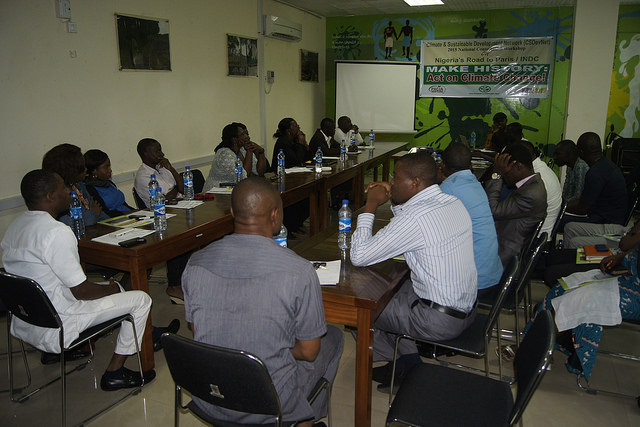The civil society declares its official position regarding Nigeria’s actions ahead of Paris 2015 after a two-day forum held recently in Abuja, the federal capital city

We, the representatives of Nigerian Civil Society under the aegis of Climate and Sustainable Development Network of Nigeria (CSDevNet), held a two-day National Consultative Workshop on Nigeria’s Road to Paris: INDCs & SDGs.
The meetings, which took place from the 12-13 of August 2015 in Abuja drew participants from CSOs, Media, Regional and International Development Partners, grassroots community practitioners, trusts, farmer cooperatives, pastoralists, youth, women and faith-based organisations.
Recognising the role of Nigeria to speak with one voice along with other African countries on the Road to Paris and desirous that this one voice should be that of and be informed by realities of the local communities; and the fact that non-state actors contribution to the UNFCCC and the new Sustainable Development Goals (SDGs) processes and its outcomes is essential for informed policy formulation and monitoring of its implementation at all levels;
Appreciating the progress our leaders have made in coming up with a fair funding framework and tax justice mechanism at the 3rd Finance for Development Summit (FFD3) summit in Addis Ababa. The Addis Ababa Action Agenda (AAAA)
Acknowledging the outcome of the 15th Ordinary Session of AMCEN held in Cairo February 2015 which recognises the role of African civil society in actively participating and contributing to the INDC process,
Affirming the authority of the Nigerian Civil Society and communities, as the expression of the sovereign will and voice of the people;
Concerned that the Post-2015 process in Africa is experiencing needless delays, slow response to INDCs submission, lack of robust preparation and inadequate participation of civil society;
Noting that the urgency for action is underpinned by climate science and the window of opportunity for avoiding dangerous climate change is rapidly closing.

We hereby declare and adopt the following as our position on Nigeria’s Road to Paris: INDCs & SDGs:
- That Nigeria’s preparations on the Road to Paris leave much to be desired as the country is yet to experience sufficient mobilisation and involvement of all non-state actors in the build-up to a new climate treaty.
- That time is fast running out for Nigeria as processes for successor frameworks to the Kyoto Protocol and the MDGs are at advanced stages and other countries are already preparing for the implementation of these global development frameworks, the world will not wait for Nigeria. Urgency is required if these frameworks must deliver its intended outcomes for the country.
- That with the less involvement of the civil society, the media and gender representatives in Nigeria’s INDCs drafting, the process cannot be said to fully underpinned by the four guiding principles of inclusion, equity, people-centeredness and environmental sustainability.
- That now is the time to lay strong foundations for the future and ensure that Nigerian perspectives are strongly reflected in the INDCs and Post-2015 development framework. Such framework must anchor on a genuine global sustainability and low carbon development pathway, and must reflect the integrated link on social, economic, cultural and environmental dimensions of development. Any development agenda that fails to integrate these dimensions in a balanced way is not feasible for addressing present and future development challenges in Nigeria.
- That Nigeria should without delay set out how it intends to reduce emission from now until 2020, and set long term climate targets to make sure we limit temperature increase to below 1.5°C. That in communicating its INDCs to UNFCCC, it should be clearly stated that ambitious climate targets needed to keep us within the emissions budget should be shared based on the principle of common but differentiated responsibilities and respective capabilities.
- That a strong Nigerian voice is needed to ensure that the next global framework truly reflects Africa’s priorities and needs as the time for Nigerian civil society to forge alliances and constructively engage all state and non-state actors in demanding for climate action and a sustainable Nigeria is now!
- That in recognition of the implications of leadership at regional and global levels the world bestows on Nigeria, we must begin to demand immediate and countrywide mobilisation and awareness activities on the Road to Paris processes and extensive collaboration between Government and Civil society at all levels.
WHAT WE WANT TO SEE IN THE NEW AGREEMENT
ADAPTATION
Given that the consequences of and responses to the 2 degrees warming challenge vary significantly across African countries, and are often concentrated where resources are the scarcest, a coherent and comprehensive approach on adaptation under the UNFCCC is a precondition to an efficient and fair global response.
Adaptation efforts should systematically and effectively address gender-specific impacts of climate change in the areas of energy, water, food security, agriculture and fisheries, biodiversity and ecosystem services, health, industry, human settlements, disaster management, and conflict and security.
FINANCE
The finance chapter of the new agreement should aim to ensure that the post-2020 financing framework encourages a dramatic scale up of climate investments and provides support to the world’s poorest. Developed countries made a commitment at the Cancún climate summit to mobilise US$100 billion annually by 2020 to finance mitigation and adaptation actions in developing countries. Parties have agreed that the Green Climate Fund (GCF) will be one of the main instruments to channel this finance. Pledges to GCF are urgently converted to commitments so as to quickly start addressing the climate financial needs of the developing countries.
Keeping global temperatures below the 2 degree warming ceiling will require an economy-wide shift in investments from business-as-usual to low-carbon, climate-resilient models. Predictable international support mechanism to addressing climate change especially in developing countries and switching to low-carbon development pathways by all parties should underpin the new climate agreement in Paris.
LOSS & DAMAGE
The establishment of an international mechanism to provide expertise to help developing nations cope with loss and damage caused by climate impacts will remain an exercise in tokenism until the mandate and scope of the mechanism are strengthened to meet the needs of the vulnerable.
In agreeing to establish a loss and damage mechanism, countries have accepted the reality that the world is already dealing with the extensive damage caused by climate impacts, and requires a formal process to assess and deal with it, but they seem unwilling to take concrete actions to reduce the severity of these impacts. The Paris agreement should underscore the need for loss and damage.
TRANSPARENCY
The transparency framework under the new agreement will have components on mitigation, adaptation, and finance. Progress has been made since Cancún on the transparency of mitigation. Developed countries have been requested to report biennially on mitigation policies vis- à-vis targets and a mechanism for peer review has also been set up.
Looking ahead, as mitigation targets and policies are to be determined at the national level in the INDCs, establishing a transparent and credible framework for communicating between parties will be important to ensure that information disclosed will help to build trust, reputation and reciprocity. Lima signalled how difficult this would be, as countries rejected a process for scrutinising their INDCs in the coming year before these are inscribed in the 2015 agreement.
TECHNOLOGY TRANSFER
Developed countries must remove intellectual property rights, pay full incremental costs of technology transfer to protect developing countries and contribute for peaking and declining of global emission. We oppose efforts to sell rather than transfer appropriate technologies, or to strengthen rather than relax intellectual property rights.
Developed and developing countries should support the adoption and development of indigenous and locally innovated technology as well as ensuring efficiency in technology transfer and deployment.
With a membership of over 300 organisations cutting across the six geo- political zones in Nigeria, Climate & Sustainable Development Network of Nigeria (CSDevNet) brings together organisations, comprising grassroots community practitioners, trusts, federations of slum dwellers and pastoralists, home based caregivers, youth, media, women and faith-based organisations, including those working on child welfare, the elderly, people with disabilities and those focusing on livestock and animal welfare, to commonly promote and advocate pro-poor, climate-friendly and equity-based responses to climate change.
CSDevNet aspires to unify and coordinate isolated civil society efforts on climate change advocacy in Nigeria to ensure that people-centred response mechanisms are accorded desirable attention and relevance as climate change is increasingly mainstreamed in national and global poverty reduction and sustainable development strategies and actions.
